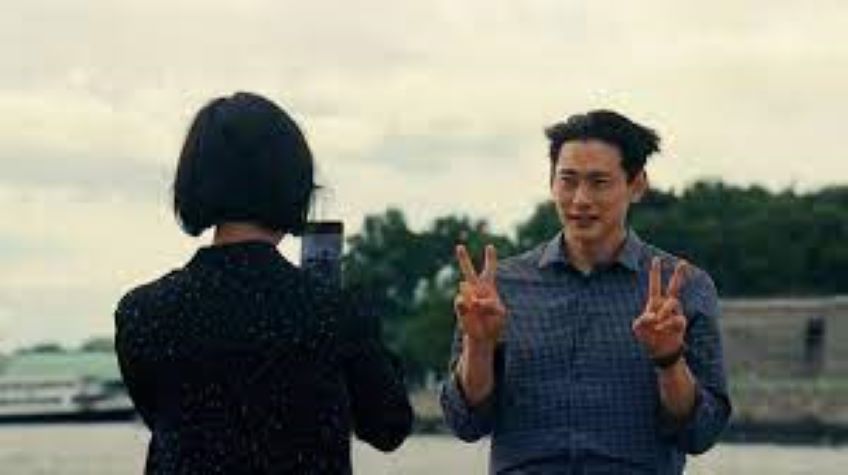Joyce Glasser reviews Past Lives (September 8, 2023) Cert. 12A, 106 mins. In cinemas
We’ve all done it: watched three people across the bar in a restaurant and wondered about their relationships; guessing who they are to one another based on their body language and perhaps their personal characteristics. Past Lives opens in a bar in New York City’s East Village where a South Korean woman sits on a bar stool between a handsome, well dressed South Korean man and a slightly frumpy, intellectual-looking white man, all in their mid or late thirties. She is locked in conversation with the Korean man, turning her back slightly to the bearded white man who cannot understand the language. In writer-director, Celine Song’s triumphant, auto-biographical feature debut, even when the story catches up with this flashforward, we are not entirely sure of the answer to the relationship game.
This achingly romantic film begins when childhood sweethearts Na Young, who wants to be a famous writer, and Hae Sung, who consoles her when he gets a first in their class and she comes second, are separated. Even at a young age, Hae Sung seems to realise, much more so than Na Young, the impact this separation would have on his life. Nothing is gratuitous in this film, so it’s apt that the music playing in the opening bar scene is Leonard Cohen’s “And that’s no way to say goodbye.”

That Na’s father, a filmmaker, is relocating to Canada for work and Na wants to be a celebrated writer suggests a family with intellectual and artistic interests and ambitions. In the playground, explaining the move, Na’s mother points out that ‘Koreans don’t win the Nobel Prize for Literature.’
Twelve years later, still thousands of miles apart, the two are reunited on the internet. While the physical attraction is palpable, and they both look forward to their increasingly frequent conversations, neither is prepared to, or emotionally able to, make the leap.
Hae Sung (Teo Yoo) is learning Mandarin, not English, and embarking on an engineering internship in China. This is the direction of the coterie of male friends we see him with at cafes, these peer meetings also helping the audience situate Hae Sung and his state of mind at various periods of his life.
While Hae Sung is heading to China, Na Young (Greta Lee), now with the Western name, Nora, has left her parents in Canada and emigrated to Brooklyn. She, too is about to embark on a new project, having been accepted on a prestigious writing programme. While Nora has feelings for Hae Sung, he is still in love with her, and, feeling inadequate, is waiting for her to make the next move. This emotional decision is put off because there is too much at stake at this junction of their lives to change course.
At the writing workshop in a serene countryside villa, Nora meets Arthur (John Magaro), the white man at the bar. She tells him she grabbed the best room by arriving early, and he has to find what is still available. What he finds is Nora.
It is when Hae Sung finally visits Nora in New York twelve years later, and the two South Koreans discuss ‘In-Yun,’ the way souls from past lives are reunited in a hierarchical way, that the register of the film changes to a poetical profundity.

‘In-Yun’ is the universe’s way of reuniting souls who shared a connection in their past lives, and it is cumulative. It is a kind of celestial dating app that eventually matches people by their previous interconnection. Becoming insecure about their relationship and if not jealous, than fearful of the impact of her re-encounter with Hae Sung, John needs reassurance.
It is a curious, yet courageous decision to portray the central character in this triangle as a woman who is neither particularly affectionate, overly caring nor physically alluring. She is the cold fish of the three, who does not reveal her feelings except through her actions. When your heart melts though, as it surely will, it melts for everyone, but particularly for Hae Sung, self-conscious about the limitations of his “typical South Korean life” that have already caused him to forsake his engagement to a girlfriend in Korea. Hae Sung’s time in NYC has taught him that Nora had to leave because that is who she is.
While the story, with its neat separations and reconnections, can appear contrived, when it’s over this objection disappears and you see how all the details fall into place so naturally they are initially undetected. You look back over the choices the characters make and understand them with more clarity.




